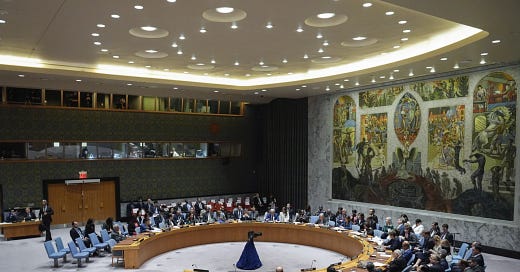US Allies Advocate 21-Day Ceasefire Between Israel and Hezbollah at the UN
The international community remains cautiously optimistic about the potential for peace in a region long beset by conflict.
US Allies Advocate 21-Day Ceasefire
New York – The United States, along with France and several allied nations, on Wednesday called for an immediate 21-day ceasefire between Israel and Hezbollah, aiming to stop the escalating conflict that has claimed more than 600 lives in Lebanon in recent days. The ceasefire proposal was introduced on the sidelines of the United Nations General Assembly in New York, where global leaders are meeting to explore diplomatic solutions to the mounting violence.
The joint statement, released by the U.S., France, and other allied countries, described the ongoing fighting as “intolerable” and warned of the “unacceptable risk of a broader regional escalation.” The statement urged both Israel and Lebanon, as well as all other involved parties, to endorse the ceasefire immediately. However, there was no immediate response from the Israeli, Lebanese, or Hezbollah representatives.
Diplomatic Push for De-escalation
The ceasefire applies exclusively to the Israel-Lebanon border, where recent exchanges of fire have forced tens of thousands of civilians from their homes. Senior U.S. officials indicated that while Hezbollah would not be a formal signatory, they believe the Lebanese government would coordinate the ceasefire with the group. American officials are optimistic that this pause could serve as a foundation for restarting long-stalled negotiations, including a potential ceasefire and hostage release agreement between Israel and Hamas.
France’s Foreign Minister, Jean-Noël Barrot, addressed the UN Security Council, urging both parties to accept the ceasefire, stating that “war is not unavoidable.” The U.S. deputy ambassador to the UN, Robert Wood, echoed this sentiment, calling on the council to back the diplomatic efforts, though specifics of the proposal were not disclosed.
International Support and Challenges Ahead
The nations backing the ceasefire include the U.S., Canada, Australia, the European Union, Germany, Italy, Japan, Saudi Arabia, the UAE, and Qatar. President Joe Biden’s national security team, led by Secretary of State Antony Blinken and National Security Adviser Jake Sullivan, worked swiftly with global allies to solidify the proposal.
Lebanese Prime Minister Najib Mikati expressed support for the ceasefire, calling it a necessary step to end the “dirty war” and urging the UN Security Council to ensure the withdrawal of Israeli forces from occupied Lebanese territories. In Israel, officials indicated a tentative willingness to pursue the ceasefire, provided that it allows civilians near the border to return home safely.
However, Hezbollah has not yet formally responded to the ceasefire proposal, leaving uncertainty over its implementation. Meanwhile, Israeli military forces continue to prepare for a potential ground operation in Lebanon, as Hezbollah fired a missile at Tel Aviv in one of the deepest strikes yet.
Efforts to Prevent Further Escalation
The ceasefire proposal aims to prevent further escalation, which many fear could spread across the region. U.S. officials hope that the 21-day pause will provide a framework for longer-term stability. President Biden has been vocal about the need for diplomacy, warning that an “all-out war is possible,” but also expressing hope that this ceasefire could lead to a broader settlement in the region.
Blinken has emphasized that a diplomatic agreement, rather than continued warfare, is the key to de-escalating tensions and allowing people to safely return to their homes along the border. “It would be through a diplomatic agreement that forces would pull back, creating a secure environment,” Blinken said.
The call for a ceasefire comes as Israel and Hamas continue their year-long war, with over 41,000 Palestinians killed in Gaza during Israeli offensives in response to Hamas’s initial attack. The U.S. and its allies have repeatedly attempted to broker a ceasefire in Gaza, with little success.
A Critical Juncture for Peace
As the international community rallies around the ceasefire proposal, the coming days will be crucial in determining whether it can lead to a temporary cessation of violence and pave the way for a broader diplomatic solution in the Middle East. Both Israel and Lebanon face mounting pressure, and the ceasefire represents a vital opportunity to prevent further bloodshed and restore stability to the region. However, the United Nations has been largely viewed as ineffective and redundant in addressing and resolving the ongoing Israel-Hamas conflict centered around Gaza, which has now spilled into southern Lebanon, involving the Iran-backed Hezbollah. Additionally, the Houthis from southern Yemen have played a further destabilizing role in the conflict.
Most of the diplomatic negotiations to date have been conducted through back channels, primarily brokered by Qatar. However, this latest effort by the U.S. and its allies is aimed at a broader international audience, signaling a genuine commitment to ending the conflict under the aegis of the United Nations. While challenges remain, this renewed push offers a glimmer of hope for de-escalation, though the outcome remains uncertain. The international community remains cautiously optimistic about the potential for peace in a region long beset by conflict.





ਤਰੱਕੀ ਦੇ ਨਾਮ ਤੇ ਬਣਾਏ ਗਏ ਹਥਿਆਰ ਅਤੇ ਬਰੂਦ ਵੀ ਤਾਂ ਖਤਮ ਕਰਨਾਂ ਹੈ ਅਤੇ ਫਿਰ ਵੱਡੀਆਂ ਤਾਕਤਾਂ ਹੋਰ ਅਸਲਾ ਬਣਾ ਕੇ ਵੇਚਣਗੇ। ਪ੍ਰੈਸ ਵਿੱਚ ਬਿਆਨ ਦੇਣਗੇ ਕਿ ਲੜਾਈ ਬੰਦ ਕਰੋ ਪਰ ਸਕੀਮਾਂ ਘੜਨਗੇ ਕਿ ਕਦੇ ਬੰਦ ਨਾਂ ਹੋਵੇ। ਆਖਰਕਾਰ ਸੁਪਰ ਤਾਕਤ ਵੀ ਬਣਨਾਂ ਹੈ ਤੇ ਵਪਾਰ ਵੀ ਕਰਨਾਂ ਹੈ